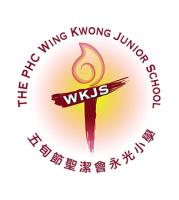| Language Policy |
With the aim of enhancing students’ English proficiency and boosting their learning performance, Mathematics is taught in English in all forms from S.1 to S.6. A portion of the Integrated Science to review concepts and content taught in Chinese in English. Our school strives to maximise students’ exposure to English and their opportunities to use the language through both curriculum measures adopted by the English Department such as drama teaching and non-curriculum measures, for instance, English corner and English speaking days. |
| Learning and Teaching Strategies |
Our school encourages the departments of different disciplines to employ a variety of teaching strategies, which includes a wide range of activities, homework designs and assessment modes that are conducive to arousing students’ interest in learning and improving their learning effectiveness. To promote e-teaching and learning, our teachers deploy a wide range of electronic platforms to foster both teacher-to-student and student-to-student interactions and to offer appropriate feedback to students through the effective use of data. The BYOD (Bring Your Own Device) Scheme in S.1, which allows all students to use their tablet computers to facilitate learning in class, is also conducive to the creation of a favourable learning environment for cultivating students’ self-directed learning, problem-solving and collaboration skills as well as boosting their self-confidence. |
| School-based curriculum |
1. Electives: 3X. Our school offers 15 elective subjects for students to choose from. 3X: S.4, 2X: S5 and S6.<br> 2. Curriculum highlights: To arouse our students’ interest in the learning of languages, junior-form curricula of both Chinese and English are specially tailored for the needs of our students, with the incorporation of drama into teaching. Other school-based curricula also include junior-form Computer Literacy, Life Education and STEAM/DT Education. |
| Approach to Catering for Learner Diversity |
To cope with student diversity, small-class teaching is adopted. For instance, in Chinese Language and English Language lessons, junior form students will be divided into groups according to their abilities so that teachers can pay more attention to those who need help. Besides this, a myriad of class activities and specially-designed materials are used to motivate students and help them learn better. |
| Approach to Integrated Education |
Our school strives to establish an inclusive campus culture by adopting a whole school approach through the ‘Learning Diversity Concern Group’, a committee comprised of the vice principal, the Special Educational Needs Coordinator (SENCO), supporting teachers for special educational needs, teachers of the three core subjects including Chinese, English and Mathematics, teaching assistants and counsellors. To support students with special educational needs in different tier groups, the three-tiered intervention model is adopted to evaluate students’ learning progress and the effectiveness of support measures on a regular basis. The learning support grant is also effectively utilised to employ counsellors and hire service providers, who offer services such as speech therapy, emotion management training, art therapy, career and life planning, after-school tutorials and interest classes to help students learn better and realise their potential. In addition, our school-based educational psychologist renders consultation services to teachers, conducts suitable psycho-educational assessments for specific students and offers professional advice on the design of support programmes according to the educational, emotional and behavioral needs of individual students. |
| Education Support for Non-Chinese Speaking (NCS) Students |
|
| Home-School Co-operation |
Laying great emphasis on support for parents, our school has set up the Parent-Teacher Association to foster better relations with parents. Through parenting talks on different themes, workshops on promoting mental health, picnics and regular meetings, parents have the opportunity to be involved in the school development and the nurture of the next generation. To care for parents’ spiritual needs, the Parent Fellowship, set up by the school and the church, organises various evangelical activities to enable support between parents and help them know more about Christianity. |
| School Ethos |
Our students are well-behaved, and the rapport between teachers and students is strong. In recent years, our school has been actively promoting class culture by strengthening the training of class committee members and allowing them to develop multiple intelligences and gain successful experiences from organising class-based activities. In addition, the school collaborates regularly with other organisations to arrange various activities to help promote students’ growth and boost their self-image. |
| School Development Plan |
1. Advancing with the times, bolstering students’ self-confidence and autonomy: <br>- Promoting self-assurance, pursuit of improvement and initiative in learning, cultivating the Wingkwongers’ attributes of being reflective, inquisitive and principled<br>2. Establishing positive relationships, maximising students’ character strengths: <br>- Building positive relationships, learning to love oneself and others, cultivating the Wingkwongers’ attributes of being communicative, caring and spiritual. |
| Teacher Professional Training and Development |
With the aim of enhancing teaching quality, professional training and development is the continual focus of our school. At the school level, professional development activities related to the school’s major concerns are organised on staff development days to build effective team work. As regards the subject level, collaborative lesson preparation is conducted regularly to promote professional exchange, increasing the teaching and learning effectiveness. |
| Life-wide Learning |
There are over 30 extra-curricular clubs in our school, falling into 5 categories namely academic study, interests, services, physical education and arts. They aim at arousing students' interests and exploring their potential of becoming a student leader. We actively participate in different inter-school and exchange activities so as to provide students with life-wide learning experiences. |
